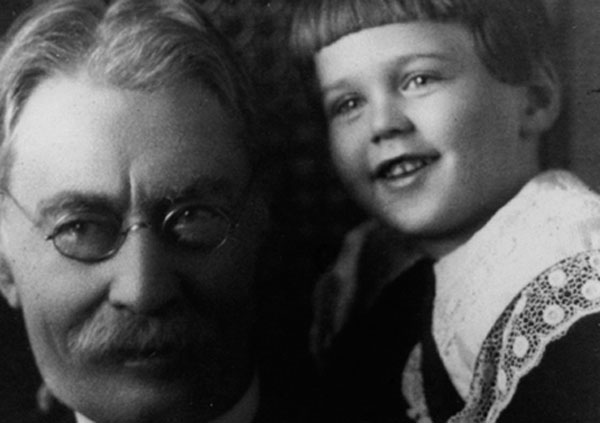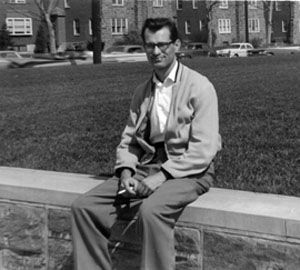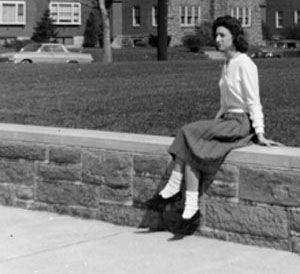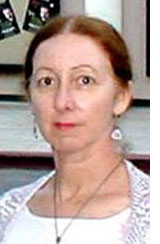| |
|

Scholar-in-residence
● Rabbi Ari
Kahn, director, Foreign Student Programs,
Bar Ilan University, Israel, Feb.
22-23
Presentations are free; kosher meals moderately priced
Call us for details at (619)
287-9890, Please reserve Shabbaton meals

JERUSALEM DIARY
Terrorist feels victims' pain in last moment
By Judy Lash Balint
 JERUSALEM—Imad Mugniyah. JERUSALEM—Imad Mugniyah.
All the major news outlets are reporting the "elimination" in Damascus of one of the world's most wanted terrorists:
A car bomb in Damascus on Tuesday killed a senior military commander of the Lebanese Shiite Muslim group Hizbullah, a Lebanese political source toldReuters on Wednesday.
According to the al-Manar television channel, the man killed was Imad Moughnieh, one of Hizbullah's founders and the organization's operational commander. The channel blamed Israel for the assassination.
Witnesses had seen the body of a man taken from the scene of the blast in
the Syrian capital on Tuesday evening.
Moughnieh is believed to be the mastermind behind the attacks against Jewish
centers in Buenos Aires in 1994, as well as the kidnapping of a TWA airplane
in Lebanon in 1985 and the abduction of westerners in the country during the
1980s.
The United States considers Moughnieh to be the man behind the bombing at
the American embassy in Beirut in and the attack against the Marines in 1994
headquarters in Lebanon in 1983, which killed over 200 Americans.
Is anyone in Israel or the US passing out candies or jumping up and down in the streets? Not quite...Israel Radio interviewed the widow of one of the Israeli officials murdered in the Buenos Aires Israeli Embassy bombing. She really didn't have much to say, other than to recall that dreadful day in 1994, and quietly say that some other terrorist will surely rise up to take Moughnieh's place.
Great speculation here as to how such an operation could have taken place in Damascus, of all places. Moughnieh's Pajero vehicle was blown up around midnight. He was one of the world's most hunted terrorists whose movements were reported to be as hidden as Osama Bin Laden's. Hizbollah leader Nasrallah will preside over the funeral in Lebanon. Wouldn't want to be in charge of security arrangements at that event...


THE VIEW FROM JINSA
The avenger, the minion and the protector
By Shoshana Bryen
 WASHINGTON, D.C. —The Avenger: Somewhere in another realm, 241 Marines, 58 French soldiers, Navy Diver Robert Dean Stethem, 95 Argentinean Jews, and hundreds of other less-visible-but-no-less-important victims are avenged. In this world, their families and friends may be comforted by the fact that Imad Fayez Mughniyeh died in little pieces. WASHINGTON, D.C. —The Avenger: Somewhere in another realm, 241 Marines, 58 French soldiers, Navy Diver Robert Dean Stethem, 95 Argentinean Jews, and hundreds of other less-visible-but-no-less-important victims are avenged. In this world, their families and friends may be comforted by the fact that Imad Fayez Mughniyeh died in little pieces.
Mughniyeh, Hezbollah's "supreme commander," was a believer in suicide bombs for others, while he lived comfortably in Damascus. He took hostages and orchestrated the wreckage of Lebanon by his minions, while he was safe in the arms of Junior Assad and his Iranian overlords. He orchestrated the bombings of the Israeli Embassy in Buenos Aires and the Jewish Center there. He lived for the destruction of Israel and the killing of Jews. Someone lived for his destruction and killed him as he killed.
We owe someone thanks for the symmetry.
Haj Hussein Khalil, Hezbollah's deputy for "political affairs" died in the same explosion.
That's nice, too.
The Minions: Syria is Iran's satrapy with all that implies about terrorism, about Lebanon and about Israel. But Damascus has become a vacation spot of sorts for politicians with delusions of importance and out-of-power wannabe Secretaries of State. Sen. Arlen Spector - who's other chief occupation is grilling the NFL Commissioner about the destruction of New England Patriot tapes - visited recently, not for the first time.
Zbigniew Brzezinski, senior foreign policy advisor to Barak Obama, and once-National Security Advisor to President Carter, planned his trip apparently without notice to the US Embassy. A spokesperson said his delegation would be "meeting with several different people, community leaders and government officials throughout the Middle East." We'd like to know who he thinks is "leading communities" in Syria. Brzezinski was in charge when the Ayatollahs occupied Iran and our Embassy, and his administration ill-served both the American and the Iranian people.
Americans who treat Junior as if he deserves a seat at the diplomatic table - and that includes Condoleezza Rice, who invited the Syrians to Annapolis - serve as minions of the dictator. The Syrian and Lebanese people know that important Americans visit "President Assad," and don't hear a word about American support for individual rights and freedom. They are left to believe that Americans don't care, and the implications of that are profound.
The Protector: We note sadly the passing of Congressman Tom Lantos, Holocaust survivor and champion of human rights. Lantos translated the brutality visited upon him and his people by the Nazis into a lifetime in pursuit of justice for those unable to defend themselves. He shone the spotlight on suffering in Rwanda, Bosnia, Darfur, Iraq and Iran, and he was a lion on behalf of Israel and the security of the Jewish people. There will never be another Holocaust survivor elected to Congress, and the implications of that are profound as well.



 t t
THE JEWISH CITIZEN
Youth, not a time of life; a state of mind
By Donald H. Harrison
 SAN DIEGO—To really appreciate the documentary So Long Are You Young, it is helpful to have read the poem Youth by Samuel Ullman, because the documentary is a story of how Ullman, like his fellow Jewish American poet Emma Lazarus, inspired people all over the world. SAN DIEGO—To really appreciate the documentary So Long Are You Young, it is helpful to have read the poem Youth by Samuel Ullman, because the documentary is a story of how Ullman, like his fellow Jewish American poet Emma Lazarus, inspired people all over the world.
So, without further ado, here is Youth, written by Ullman in Birmingham, Alabama, in 1917.
Youth is not a time of life; it is a state of mind; it is not a matter of rosy cheeks, red lips and supple knees; it is a matter of the will, a quality of the imagination, a vigor of the emotions; it is the freshness of the deep springs of life.
Youth means a temperamental predominance of courage over timidity of the appetite, for adventure over the love of ease. This often exists in a man of sixty more than a body of twenty. Nobody grows old merely by a number of years. We grow old by deserting our ideals.
Years may wrinkle the skin, but to give up enthusiasm wrinkles the soul. Worry, fear, self-distrust bows the heart and turns the spirit back to dust.
Whether sixty or sixteen, there is in every human being's heart the lure of wonder, the unfailing child-like appetite of what's next, and the joy of the game of living. In the center of your heart and my heart there is a wireless station; so long as it receives messages of beauty, hope, cheer, courage and power from men and from the Infinite, so long are you young.
When the aerials are down, and your spirit is covered with snows of cynicism and the ice of pessimism, then you are grown old, even at twenty, but as long as your aerials are up, to catch the waves of optimism, there is hope you may die young at eighty.
Ullman was 77 and deaf when he wrote those lines in 1917. He would live for another seven years, dying young at 84. His poem, along with others, was published by his family in a limited edition printing. During World War II, in what were some of his darkest moments after the expulsion of U.S. forces from the Philippines, U.S. Gen. Douglas MacArthur read the poem, and it gave him hope. Later, when
Japan was defeated and MacArthur took charge of its military occupation government, MacArthur posted the poem in his headquarters. The Japanese, then in their darkest moments, took its message to heart, and it was reprinted and recited throughout the country, even converted to song.
 The 59-minute documentary by Judith Schaefer and Ullman's grandson, Jonas Rosenfield, on the impact Youth has had, not only on Japan but in South Korea and in the American South, will be presented at the 18th Annual San Diego Jewish Film Festival at 4:30 p.m. Sunday, Feb. 17, at the AMC La Jolla. The program, cosponsored by the San Diego Asian Film Festival, will be accompanied by a presentation by motivational speaker Edith Eva Eger, a Holocaust survivor. The 59-minute documentary by Judith Schaefer and Ullman's grandson, Jonas Rosenfield, on the impact Youth has had, not only on Japan but in South Korea and in the American South, will be presented at the 18th Annual San Diego Jewish Film Festival at 4:30 p.m. Sunday, Feb. 17, at the AMC La Jolla. The program, cosponsored by the San Diego Asian Film Festival, will be accompanied by a presentation by motivational speaker Edith Eva Eger, a Holocaust survivor.
Among the poem's devotees was Konosuki Matsushita, owner of a successful electronics company who decided, after reading the poem, that his age should not be a barrier to founding a new brand, Panasonic. Another was Robert F. Kennedy, who quoted it while U.S. attorney general. After RFK was martyred by an assassin, his brother, Sen. Edward Kennedy, included portions of the poem in his eulogy. The impact that the poem had on Japan was commented upon in the documentary by former U.S. Vice President Walter Mondale, who also had served as America's ambassador to Japan. The South Korean leader Kim Dae Jung, running successfully for president in his 70s, pointedly quoted Youth to opponents.
Ullman, we learn in the documentary, impacted people not only in his words but in his deeds. Born in 1840, he moved with his family from Germany to the United States via New Orleans in 1850. He grew up in Port Gibson, Mississippi, where his family operated a butcher shop, owned slaves, and embraced the Confederacy. Ullman enlisted in the Confederate Army, fighting under General Robert E. Lee in one of the bloodiest battles in history at Antietam. Following the war, he started life over, opening a dry goods store in Natchez, Mississippi, and affiliating with a Reform congregation, B'nai Israel, in which he rose to prominence. He married school teacher Emma Mayer, and together they staffed quarantine stations to protect their city against yellow fever that had swept upriver from New Orleans. His business was not successful, so in 1880, the Ullmans relocated to Birmingham.
In that industrial city, he opened a hardware company that was not particularly successful, and joined Temple Emanuel. After a rabbi departed the congregation in a dispute, Ullman served as the lay leader. With Emma, he was a driving force for the opening of Ullman Hospital for the benefit of financially needy patients. He also was appointed to the Birmingham Board of Education, where he joined with the superintendent in pressing for free high school education for Blacks, a drive that culminated in the opening of Industrial High school—later renamed as Parker High School.
U.S. Rep. John Lewis, who had been a leader in the U.S. Civil Rights Movement of the 1960s, reflected in the documentary that Ullman made an important contribution by insisting that Blacks, as well as Whites, deserved to be educated. He described Ullman as a "man of raw courage." Among the high school's more famous graduates was Alma Powell, whose husband, Gen. Colin Powell, was chairman of the Joint Chiefs of Staff and later U.S. Secretary of State.
Ullman may not be as well known as he should be throughout the rest of the United States, but a building is named after him at the University of Alabama. The Ullman School that started as an elementary school and later evolved into a high school is located in Birmingham. Today, Japanese tourists visit both locations , thinking of them as American shrines to the memory of a man who in Japan is regarded as a hero.



 
REFLECTIONS
It Was No Ordinary Walk
By Sheila Orysiek
 SAN DIEGO—There we were dear one, walking hand in hand, heart in heart. It was a fine spring day and no ordinary walk. The tall maples were in new leaf, the birds singing the song that was in our souls. We looked into each other's eyes and thought the same thoughts. The city streets we trod were no longer common place, not that day. The people whose houses we passed didn’t realize how special it all was. They just saw two young people walking. But it was not so. Our errand was to begin our lives together. I remember well the evening two years before when you had asked me to marry you. I remember also when I gave you my consent and your eyes lit up with joy. We had spent the time since hoping, learning, planning. SAN DIEGO—There we were dear one, walking hand in hand, heart in heart. It was a fine spring day and no ordinary walk. The tall maples were in new leaf, the birds singing the song that was in our souls. We looked into each other's eyes and thought the same thoughts. The city streets we trod were no longer common place, not that day. The people whose houses we passed didn’t realize how special it all was. They just saw two young people walking. But it was not so. Our errand was to begin our lives together. I remember well the evening two years before when you had asked me to marry you. I remember also when I gave you my consent and your eyes lit up with joy. We had spent the time since hoping, learning, planning.
Your question and my answer were the easy decisions. We faced a number of obstacles and that walk of ours on that wonderful spring day represented our determination to pursue our destiny; a Reformed Jewish wedding ceremony in our future. No, that was no ordinary walk. We stopped at a low stone wall and I sat upon it and you took my picture. Then you sat on the wall and I took your picture. Pity there was no one about to capture the two of us in that moment. But now I look at those two pictures these many years later and I see you sitting there, your hair was dark then without a thought of gray; a slight, shy smile on your lips. You were a young man reaching the height of your glory, a marriage and a career stretching ahead of you.
You rarely like having your picture taken but you allowed me to do it. Then I look at the snapshot of me. I see a young woman, smooth skin, thick dark hair and such confidence on her face. She has no doubt about what she is about to do. She envisions the new home she will help to create and she is eager to begin. I remember how I felt that day. I was most prescient; my life with you has been a blessing to me.
It was no trivial walk that day. The destination was to a travel agent to plan our honeymoon trip - but it was really much further than that. It was a beginning of a new life together. The spring season was not only around us but also within us. We were bursting with life as we ran toward our future trusting, questing, confident. Our plans were rippling from our mouths, words spilling from our lips. All these years later we still walk together, arm in arm, but we don’t need to talk quite as much.
And so, my friend, my lover, my husband, let us continue our walk. If I should be the one who first climbs the stair step to eternity I will pause and patiently wait for you. If you should be the first, perhaps you’ll slow your stride and allow me to catch up. Hand in hand, heart in heart, still walking.
Forty-five years later.

 . .
SAN DIEGO JEWISH WORLD THE WEEK IN REVIEW
Rabbi Michael Berk in La Jolla, California: What kind of plague is darkness?
Carol Davis in Coronado, California: This 'Dolly' is bound to improve with age
Peter Garas in Canberra, Australia: Writer has 'out of this world' name
Donald H. Harrison in San Diego: Aviva, what part of you would you sell?
Congressman Bob Filner in Washington, D.C.: The nation mourns death of Congressman Tom Lantos, a champion of human rights
Donald H. Harrison in San Diego: A Love to Hide refers to two relationships
J. Zel Lurie in Delray Beach, Florida: Hillary Clinton will be our next President
Ira Sharkansky in Jerusalem: Most Israelis favor strong retaliation against Gaza for rocket attacks
Peter Garas in Canberra, Australia: Human Rights Watch targets Israel's power cutoff to Gaza, but ignores actions by others
Donald H. Harrison in San Diego: An imaginative Israel trip for preschoolers
Sheila Orysiek in San Diego: Civil Rights Act of 1964 - Forgotten Facts
Plus: Our Australia bureau chief, Garry Fabian tells, story of his childhood in Theresienstadt, immigration to Australia
Shoshana Bryen in Washington, D.C. : Gaza crisis threatens Mubarek's rule
Donald H. Harrison in San Diego: Paying attention to Paying for Justice
Rabbi Baruch Lederman in San Diego: A Shmitah miracle in a banana orchard
Sheila Orysiek in San Diego: A letter to Margot—19 years wasn't enough
Rabbi Leonard Rosenthal in San Diego: The more you study, the more to learn
Lynne Thrope in Encinitas, California: The buzz about Firefly Grill & Wine Bar
Peter Garas in Canberra, Australia: Finding mom's effects led to columnist's study of genealogy and the Holocaust
Donald H. Harrison in San Diego: San Diegans bid farewell to Rose Schiff: matriarch to performers and educators
Donald H. Harrison in San Diego: When triplet sisters become mothers
< BACK TO TOP
|
|
